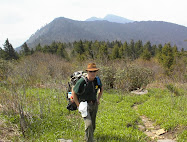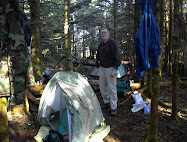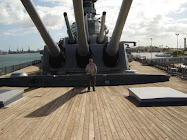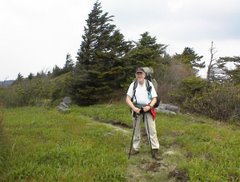The life of a Southern soldier
is such a life of ease;
the cold and the dark
are but a bad dream.
September 10, 1864 dawned a bit cooler than the past few days. Whit and I left Camp Vance early that morning with about seventy-five other men to serve as replacements in various units in Petersburg. We rode on an old box car made for cattle. They herded us aboard and we sat shoulder to shoulder on the rocking train as it rolled toward the battlefields of Virginia. The undulating hills, woods and fields rolled by with what became a dull sameness. Decay and neglect were evident in the countryside as we passed, the steel wheels clacking rhythmically beneath us. Whit stayed close to me the whole time. He had come to look to me to take care of him. I don’t know why since I was just as scared and lonesome as he was. In the afternoon of the 11th, it started to rain. The rain soaked us as it blew in through the slats in the car, and the wind that whipped us felt cold. It was a miserable ride toward a dreaded destination.
After riding all that day and most of the next, we got off somewhere in Virginia and marched the rest of the way to Petersburg. Sections of track in the area were torn up by Federal Cavalry and the trains that were able to get through in Southern Virginia were needed for more important cargo I suppose. We stopped for the night about forty five miles west of Petersburg at about seven o’clock. A light rain fell as we made camp.
I checked my Pa’s pocket watch to be sure it was dry. He had left it to me when he went on to be with the Lord. He must have saved up his money for years to buy that watch. It came all the way from Switzerland and was made of silver with some fancy carving on it. He only got to use it two years before he passed on. I remember that day well. It was a dark stain on the pages of my life. My Pa sat down in his rocking chair one night, after supper, and closed his eyes and in a little while, he was gone. We never knew why. He had been having some pains in his chest and arms and some folks said it was neuralgia, but nobody really knew for sure. His passing hit me hard. I had to take care of that watch. It was what I had to remember him by. I kept it wrapped tight in a little oil cloth to keep it clean and dry.
We cooked up a little fat back and eggs for supper then soaked some hardtack in the grease for a dessert. It wasn’t half bad considering where we were and how we were living at the time. The sergeant placed pickets at a hundred to two hundred yards out because of the possibility there was Yankee cavalry roaming about. The night was warm and the rain had stopped, so we put out the fire early. I strolled out from the camp a ways and lay down in a little clearing and began to search the sky. The clouds had blown off. The stars were bright pinpoints on the coal black canvas of night.
As I lay there, looking up, I began to wonder if I would ever see my family again, or plow old Moses, or even see my farm again. I couldn’t help it; my eyes began to grow moist. I love my wife and my children and I knew how badly they needed me at home. I knew Harriett would try to plow the mule and keep things running, but she’s a woman and was not built for that kind of work. My girls could not be of much help with the heavy work, though I was sure they would try.
I thought about the war, about why I was here and the thoughts ran into a dead end. I lay there under the stars, looking up at God’s heaven. It surely was beautiful here in Virginia, a lot like home. I also thought about how good the weather was, good for working the fields, for cutting firewood for the winter, for just enjoying God’s nature. A farmer always keeps a weather eye out. You have to work the fields when you can, because the times are many when the weather won’t let you, when it’s too wet to plow or too cold and the ground’s hard. The house needs some work too. I needed to split some new shingles for the roof. Then I thought, Lord, that roof’s going to leak this winter just as sure as I’m laying here. What will Harriett do? She’ll probably get a bunch of pots and buckets and catch the water as best she can. She’s like that, doesn’t complain, and just does what needs to be done. Lord, I miss that woman, the light of my life.
About the time I started thinking about Harriett and was kind of losing myself in the thought, along came Whit with a dreadful hacking. He let go a stream of tobacco juice with well practiced ease and said, “Better come on and get in the sack, Francis, long day tomorr’, startin’ before sunup.”
“I’ll be on in a bit,” I said.
Of course that didn’t satisfy Whit. He settled himself down on the ground beside me and reclined with an exaggerated groan, following my gaze upward. Then he asked, “What you lookin’ at, Francis?”
I replied without looking at him, “Just the sky.”
He cocked his head and asked, “Why you lookin’ at the sky? Worried about the weather? You don’t have to plow tomorr’.”
“I’m just lookin’ and thinkin’.”
He wrinkled his brow, “I know what you mean. Say, I been thinkin’ for some time about somethin’.”
“What’s that,” I asked, not really wanting to know the answer because Whit’s mind is a garden of the trivial.
He said “I was wonderin’ why your maw and paw named you Francis. Ain’t that a girl’s name?”
I sighed and smiled to myself at the familiar question. “It is a girl’s name if it’s spelled with a ‘E.’ My name’s spelled with a ‘I.’”
He grunted. “You mean one little letter is the difference between yore name and a girl’s?”
“That’s right.”
Then he asked with some agitation, “Well why didn’t they name you John, or Robert or William or something that couldn’t be confused with a girl?”
Again I smiled to myself and said, “My folks named me for the great general of the Revolution, Francis Marion. He was called the ‘Swamp Fox’ because he outfoxed the Brits and the Tories. He would attack them and then fade into the swamps down in the South Carolina low country; he just disappeared in those dismal haunts like a ghost.
“My Paw was real impressed with the stories about the Swamp Fox, so he named me after him. My grandpa, James Yelton, fought in the Revolution. He was a die hard Patriot. He lived to be ninety-three years old. My Pa was so proud of my Grandpa and his fightin’ the Tories and the British in the Revolution. He wanted me to carry on a famous revolutionary hero’s name. So that’s how I came to have the name ‘Francis.’”
Whit was silent for several minutes. Then he looked at me with this sort of amazed grin and said, “Well, I’ll be the son of Red Coat!” He shook his head a couple of times and said, “I’ll be, I’ll be.”
I think for once I answered one of Whit’s questions without him having to ask fifty more questions about “why.” “I guess we better turn in,” I said, and we walked back to camp where the other men were already sawing logs. I lay there for a long time before I went to sleep, wondering about the future. Will I make it home? Will I be crippled by a Yankee bullet? Will I see my family again? It all rolled over and over in my head until I finally fell asleep.
Wednesday, July 15, 2009
Friday, July 10, 2009
Comment
Thanks to O.M. Dalessandro for the comment on my Gettysburg post. I have seen the Burns documentary of course and heard the music, but it did not strike me like the Gettysburg score did. That may be partially because I bought the CD and have listed to it so many times. In any case, I have a hard time imagining a more powerful expression in music of the War and specifically of the Battle of Gettysburg.
Subscribe to:
Posts (Atom)






